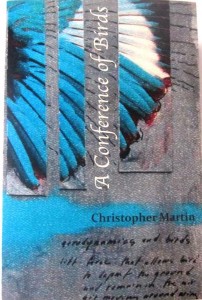At Wild South’s recent “Green Tie Gala,” friend, writer, poet and publisher,  Thomas Rain Crowe, with knowing wink, slipped a slim beautifully bound chapbook into my hands. I cracked it open immediately upon arriving home and read the first poem “Antidote to Narcissus”
Thomas Rain Crowe, with knowing wink, slipped a slim beautifully bound chapbook into my hands. I cracked it open immediately upon arriving home and read the first poem “Antidote to Narcissus”
I’ve heard the great blue heron
Cannot see its own reflection
Cast from the water’s surface—
a gift that it may never lose a fish
in the image of a perfect eye
or fail to see a frog amid
such slate feathers shed
from a rookery on high.
If only we could fade that way
Into the mist of rivers,
Into rhododendron shade;
If only we could be so beautiful
And not know a thing about it.
I perused some of the 14 other titles – “Parable of the Flycatcher,” “The Nuthatch,” “Hawks: A Homily,” “Parable of the Wren,” – then closed the book and left it on the kitchen counter near the coffee pot to wait for dawn.
Next morning with coffee and book in hand I sat out on the deck where towhees were conferring with chickadees and cardinals conversed with wrens to read the rest of A Conference of Birds. The book is Christopher Martin’s first book of poetry. Martin lives in the Georgia piedmont near Kennesaw Mountain with his wife and two children and is pursuing a Master of Arts in Professional Writing at Kennesaw State University. He is the editor of the online literary magazine Flycatcher: A Journal of Native Imagination and his work has appeared or is forthcoming in “Shambhala Sun,” “Loose Change Magazine,” “New Southerner,” “Buddhist Poetry Review,” and others. Martin is working on “Native Moments: An Ecology of Fatherhood,” a collection of essays and has contributed to the “Elevate/Art Above Underground” project in Atlanta.
Nature has called to poets ever since there have been poets. It spurred ancient Greek poet Theocritus to pen his idylls and has been muse for every epoch of literary history. And poets like Wordsworth, Coleridge, Burns and Blake penned lines in the voice of their time and passed the baton on to Emerson, Thoreau, and others then followed by Frost who knew how to turn a common phrase and today, in voices of their own poets like Mary Oliver, and closer to home, Janisse Ray and Thomas Rain
Crowe and others with open eyes; open ears and open hearts speak to us in clear voices – not only about the world around us but how the world around us and the world within us is only one world.
Martin has a strong, clear and compelling voice to add – from “Hawks: A Homily” “…But I wonder how one can speak/of angels, whose wings we have not seen,/when red-tail hawks still fly over interstates/on black-dappled, rust, red, white-brushed,/creation-colored wings,/and nest on rooftops/angels never would.”
And he understands how those worlds are intertwined, “…My child cannot see that far,/I’m sure, cannot see the falling,/dancing flares of dark purple,/the swallows that follow dragonflies./Before my son, I’m not sure/I would have seen them, either,/not sure I would have opened my eyes.” From “Watching Purple Martins.”
I found Martin’s poetry tight and timely; what poetry is about – in the now, while brushing eternity. I know you can purchase A Conference of Birds here – http://www.spdbooks.org/Producte/9781883197261/a-conference-of-birds.aspx. Or for more information contact New Native Press at http://www.newnativepress.com/.
